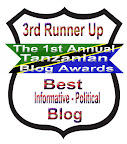Go to Mozambique*, they said. It's fabulous there, they said. Wonderful country...they said. I got excited. Mozambique...even the name suggests that this is no ordinary place. It's got z's and q's in it and is pronounced differently by every accent I have ever heard. We call it Msumbiji up here, our quiescent neighbor with whom we have a long relationship colored by the harder, darker parts of liberation and pan-Africanism...
Maputo is beautiful. No, scratch that; Maputo is gorgeous. It is low-lying and tightly bound to generations of secrets of the soils and sea. Everything feels just a little bit dangerous here, behind the smiles are silences that reeks of caution. Maputo, Quelimane: they are beautiful to me the way that a venus flytrap is beautiful, the way that a panther is beautiful, the way that the hand-carved pommel of my grandfather's 19th/20th century rifle is beautiful.
Tanzania is a complex society- we have many byzantine tendencies that I don't find in the same quantities in fellow Southern African states- let alone Kenya. Double-speak is natural to us, Kiswahili doesn't lend itself to plainness unless one intends to be brutal. But Mozambique? Schooled me. I have never met a people who have such natural resistance to the Tanzanian Charm Offensive. Considering how much I depend on the TCO to navigate, this was a shock. I'm afraid it is hard to outclass a seasoned Tanzanian social operator, but we have nothing at all on our Mozambican neighbors.
Respect.
I like complicated places. Lost lands call to me. This Quelimane (Kilimani) that we went to: southern outpost of the Swahili Coast, even further out than the mysterious ruins of Qiloa (Kilwa). I was curious to see what it would be like in these quiet hinterlands of the former Sultanate of Zanzibar. Would the music hark to the sound of violin strings and Swahili Blues, would the architecture show glimpses of the slave markets? Would I be woken by the warm and familiar sounds of the morning call to prayer, would they tie their khangas the same way- would they even call them khanga? Would 'salaam' or some version of it work as a greeting?
In the end, no. They drink Five Roses tea in Mozambique, no spices, for shame. They showed me the school where Robert Mugabe taught back in the 1980s. All of their main streets are cryptically named for long-forgetten events, or after the many dead of the African Leftist past. They bury authors in their Hero's Crypt, not just soldiers. They dance like nobody is watching.
In the end, no. They drink Five Roses tea in Mozambique, no spices, for shame. They showed me the school where Robert Mugabe taught back in the 1980s. All of their main streets are cryptically named for long-forgetten events, or after the many dead of the African Leftist past. They bury authors in their Hero's Crypt, not just soldiers. They dance like nobody is watching.
Bom Dia. Todo Bem. Long beards and kanzus abound, as do crumbling churches and filigreed mosques. Everyone is a little bit of something and a little bit of something else: afro-portuguese, mixed, situated. They might not make it obvious by my god, the place is steeped in class and race/color divisions with a healthy helping of religious polarities- all this besides the political divisions of a post-civil-war society. Perpetually wet with rain, ridiculously fecund, with an architecture that seems to want to both recruit you to a greater cause and break your heart all at once!
"I have never heard you talk about a country like this before" said La Dee, amused that I had to call every 48 hours to download how overwhelmed I was. This is no land to put a sensitive soul into, unwarned. Poets and writers, singers and lovers, travelers and dreamers: be thou careful here. You might go, but coming back will be a science.
Go to Mozambique, they said. It's fabulous there, they said. Wonderful country...they said. Mozambique...even the name suggests that this is no ordinary place. Mozambique yielded almost none of her secrets to me, which can only mean that I must now labor under this mystery. It will be a deep and desperate and unrequited love. Honestly, Africanism is not a healthy lifestyle. I don't recommend it. I love it. I am conflicted. These places that begin with Q? Queridos.
*So on the official side: I am part of a team working on a Learning Pilot with the Public Service Accountability Monitor (PSAM) based at Rhodes University in South Africa. We have blog. If you are in 'Development', have an interest in Governance/Southern Africa/ Civil Society/ Development Practice/Research Methodologies/Aid and Donors et cetera? Come by and read, it's pretty good. Karibu.


